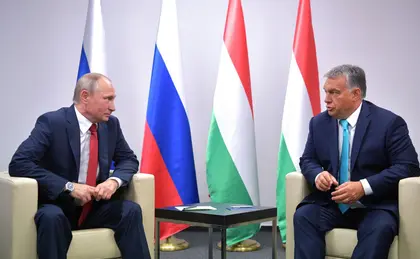Hungary erected another obstacle to Ukraine’s cooperation efforts with NATO by blocking Kyiv from joining the alliance’s cyber defense center.
Oleksiy Danilov, secretary of Ukraine’s National Security and Defense Council, said on Feb. 4 that the populist right-wing government of Prime Minister Viktor Orban was the only NATO member to veto the move.
The national security chief said Ukraine had last year applied to join the Estonian-based NATO Cooperative Cyber Defense of Excellence (CCDCOE) and that all requirements had been met.
The veto essentially sets Ukraine’s prospects back of joining the cyber defense center for at least six months, since applications to join are reviewed bi-annually.
Orban’s single-party government has since 2017 prevented Ukraine from integrating more with NATO, a 30-member defense alliance that Kyiv aspires to join.
The row derives from a language and education law that Ukraine passed to elevate the status of Ukrainian as a general response to historical and artificial domination of the Russian language.
As a result, minorities can study in the relevant language in the first four years of schooling after which primary instruction switches to Ukrainian. Minority language are then relegated as a secondary subject at higher education levels – the law doesn’t apply to indigenous peoples, such as Crimean Tatars. The laws’ provision don’t prohibit the establishment of private schools for auxiliary language instruction.
Hungary and Russia balked at the law. Ukraine has argued that the law helps minorities build careers in Ukraine and to obtain a university education. Before the law was passed, 62 percent of primary school graduates at the 71 Hungarian-speaking schools failed a compulsory Ukrainian language test, according to the Swiss-based Forum for Central Eastern and Southeastern Europe (FOMOSO).
Most of Ukraine’s more than 100,000 ethnic Hungarians reside in the westernmost region of Zakarpattia (Transcarpathia).
The rejection of Ukraine to join CCDCOE comes as Kyiv faced two state-level cyberattacks on government and other institutions in January that were attributed to Russia. Moscow has denied behind being behind the attacks and has dismissed the accusation as “fake news.”
Budapest first blocked NATO meetings with Ukraine at the ministerial level. Hungary in 2019 also vetoed a NATO statement on Ukraine hours before a Russian state visit because it didn’t contain a clause on the “deprivation of rights” of the Hungarian minority in Zakarpattyia.
Viewed as the EU’s closest Russian ally, Orban has called on the EU to lift sanctions imposed on Russia for forcibly seizing Ukraine’s Crimean Peninsula in 2014. In May of that year, Orban demanded autonomy for Hungarians in Zakarpattia, which once belonged to the Austro-Hungarian monarchy until World War I ended.
Ukraine’s domestic intelligence agency, SBU, in 2018 released a video of a Hungarian consul in the Zakarpattia regional town of Berehove issuing Hungarian passports while asking the recipients to keep this secret. Ukrainian legislation forbids dual citizenship and the unnamed Hungarian consul was expelled.
And last year, Hungary signed a 15-year natural-gas purchase contract with Russian state Gazprom. The deal stipulates gas being shipped via Russian pipelines, circumventing Ukraine which neighbors Hungary.
Ukraine’s Foreign Ministry subsequently criticized the deal, calling it a political decision that made no economic sense since gas would be transported longer distances around Ukraine to reach Hungary.
Budapest’s new Russian gas contract “does not comply with the principles of the Treaty on Good Neighborliness and Cooperation between Ukraine and Hungary of December 6, 1991,” Ukraine’s Foreign Ministry said.
Orban is Europe’s longest right-wing populist government head having served as prime minister since 2010 along with his Fidesz party. He talks frequently “about the rise of Eurasia and sees Hungary as being in the center of a ‘Berlin–Moscow–Istanbul triangle’,” London-based Chatham House wrote.
“In particular, he has increased ties with Moscow in areas like energy, by joining Russian pipeline projects, granting a Russian company the contract to build a nuclear power plant, and, most recently, deciding to host the Russian-controlled International Investment Bank.”
The EU has criticized Orban’s anti-immigration stance and other policies for backsliding on the rule of law and fighting corruption. The growing concern has prompted the Organization for Security and Cooperation in Europe (OSCE) to recommend a full-scale election observation mission to Hungary for its April 3 parliamentary elections.
Last July, a European Commission rule of law report stated media freedoms and judicial independence were eroding in Hungary. A summary of the report says “risks of clientelism, favoritism, and nepotism in high-level public administration as well as risks arising from the link between businesses and political actors remain unaddressed” in Hungary.
You can also highlight the text and press Ctrl + Enter



